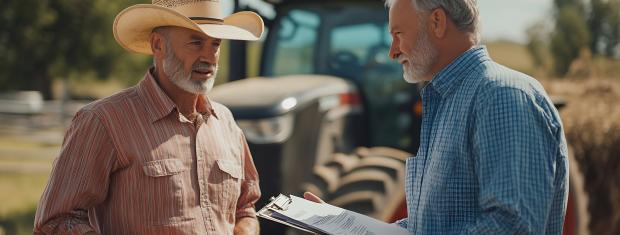
Customizing Your Farm Policy to Suit Your Needs
Running a farm involves a unique set of challenges and risks, and having the right insurance coverage is crucial to protect your livelihood. One size does not fit all when it comes to farm insurance policies, and customization is key to ensuring that your specific needs are met.
Let’s explore the different ways you can customize your farm policy to suit your individual needs:
Assessing Your Farm's Specific Needs
Before diving into policy customization, it's essential to conduct a thorough assessment of your farm's operations.
Consider factors such as:
- The size of your farm
- Any outbuildings or storage sheds on your farm
- The types of crops or livestock you raise
- Your equipment
- Any additional business activities (eg., pick-your-own operations, etc.)
This assessment will help you identify the specific risks you face and determine the coverage options that are most relevant to you.
Evaluating Property Coverage
Your farm's property, including buildings, machinery, and equipment, is a significant investment that needs protection. Standard property coverage typically includes protection against risks such as fire, theft, and natural disasters. However, you can customize this coverage by:
- Adding Replacement Cost Coverage: This option ensures that you receive the full cost of replacing damaged or destroyed property, rather than just the depreciated value.
- Scheduling Equipment: If you have high-value equipment or machinery, scheduling it individually can provide more comprehensive coverage.
- Extending Coverage for Specialized Structures: Farms often have unique structures like barns, silos, and greenhouses. Ensure these are covered adequately by specifying them in your policy.
Protecting Your Crop and Livestock
If crops and livestock are at the heart of your farm's operations, then protecting them is crucial. Customize your policy by:
- Purchasing Livestock Coverage: Livestock coverage can cover losses due to fire, lightning, being hit by a vehicle, etc. You might consider adding additional perils coverage for high-value animals to provide further protection.
- Considering Peak Season Coverage: Your farm inventory may be higher than normal during certain seasons. Peak Season coverage can provide a cost-effective way to ensure you have an adequate amount of insurance during those times.
- Adding Property in Transit Coverage: If you transport crops or livestock, transit coverage can protect against losses during transportation.
Customizing Liability Coverage
Liability risks on a farm can arise from various sources, including visitors, employees, and environmental factors. Tailor your liability coverage by:
- Adding Farm Liability Insurance: This broad coverage protects you against claims of bodily injury, property damage, and personal injury arising from your farming operations.
- Ensuring Limited Pollution Liability Coverage: Farms can face environmental risks such as pollution and chemical spills. Limited Pollution Liability coverage can help address these exposures.
- Considering Custom Farm Work Coverage: If you perform custom farm work—such as planting, harvesting, or other agricultural services for others, this coverage can protect you from liabilities and risks that may arise while working on property you do not own.
Exploring Additional Coverage Options
Beyond the basics, there are several additional coverage options that can further customize your policy to meet your needs. Some popular options offered by RMIC include:
- Business property coverage
- Earthquake coverage
- Water backup and sump overflow
- Farm income coverage
- Milk Contamination
- Equipment breakdown
- And more!
Ask your local Rockford Mutual Insurance Agent about all of our Farm Optional Coverages today!
Working With an Experienced Insurance Agent
Customizing your farm policy can be a complex process, but you don't have to do it alone. Working with an experienced insurance agent who specializes in farm insurance can make all the difference. An agent can help you navigate the various coverage options, assess your risks, and tailor a policy that fits your unique needs.
Regularly Reviewing and Updating Your Policy
As your farm prospers and evolves, so do your risks and coverage needs. It's essential to regularly review and update your policy to ensure it continues to provide adequate protection.
Schedule annual reviews with your insurance agent, maintain a comprehensive inventory of your farm property, and promptly report any significant changes to your operations, such as new equipment purchases, expansion of your farm, or changes in the types of crops or livestock you raise.
Customizing your farm policy is a proactive step towards safeguarding your livelihood and ensuring long-term success. By assessing your needs, exploring various coverage options, and working with an experienced insurance agent, you can create a policy that offers comprehensive protection tailored to your unique circumstances.
With the right coverage in place, you can focus on what you do best – running a thriving and successful farm.


